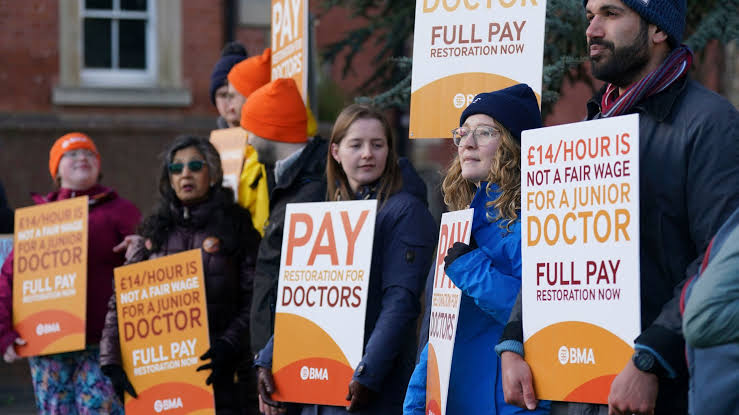After food shortages now health services in jeopardy in UK due to strike by junior doctors

Tens of thousands of doctors walked off the job across England on Tuesday, kicking off a four-day strike billed as the most disruptive in the history of the U.K.’s public health service. After the food shortages, this is going to be the second big shocker for the poor Brits.
The walkout by junior doctors, who form the backbone of hospital and clinic care in the National Health Service, is due to last until 7 a.m. on Saturday.
Junior doctors — those in the first years of their careers — make up almost half of all NHS doctors. Health service bosses say as many as 350,000 scheduled operations and appointments will be canceled during the walkout.
Senior doctors and other medics have had to be drafted in to cover for emergency services, critical care and maternity services.
Stephen Powis, medical director of NHS England, said the walkout “is going to be the most disruptive period of strike action that we’ve seen this winter, probably the most disruptive period of action in NHS history.”
The British Medical Association, the doctors’ trade union, is seeking a 35% pay raise to make up for what it says are years of below-inflation increases. The union says newly qualified medics earn just 14.09 pounds ($17) an hour — the U.K. minimum wage is just over 10 pounds an hour — though salaries rise rapidly after the first year.
Dr. Vivek Trivedi, co-chairperson of the union’s junior doctors committee, said the walkout could be stopped if Health Secretary Steve Barclay made a “credible offer” on pay. The government says it is willing to negotiate if the strike is called off, but calls the 35% demand unaffordable.
A wave of strikes has disrupted Britons’ lives for months, as workers demand pay raises to keep pace with soaring inflation, which stood at 10.4% in February.
Nurses, ambulance crews, teachers, border staff, driving examiners, bus drivers and postal workers have all walked off their jobs to demand higher pay.
Unions say wages, especially in the public sector, have fallen in real terms over the past decade, and a cost-of-living crisis fueled by sharply rising food and energy prices has left many struggling to pay their bills.




